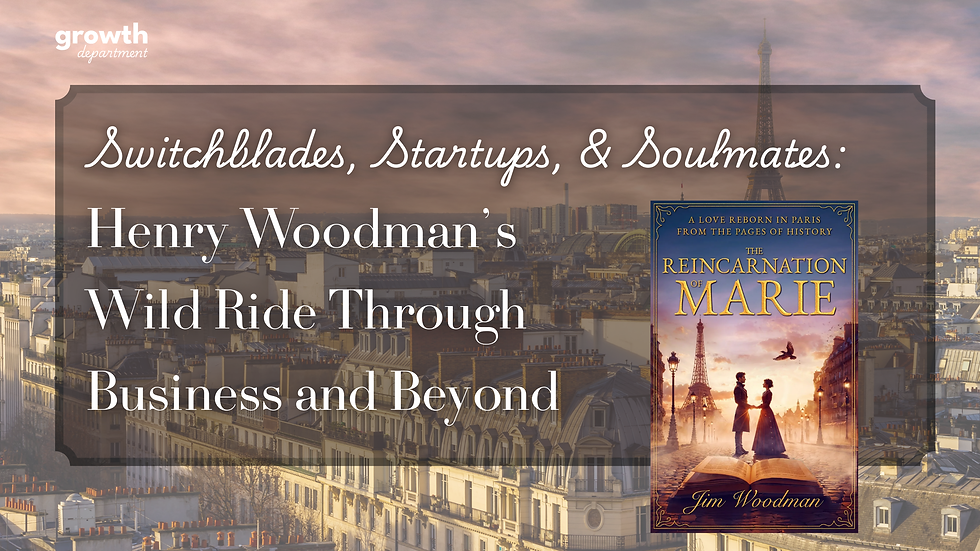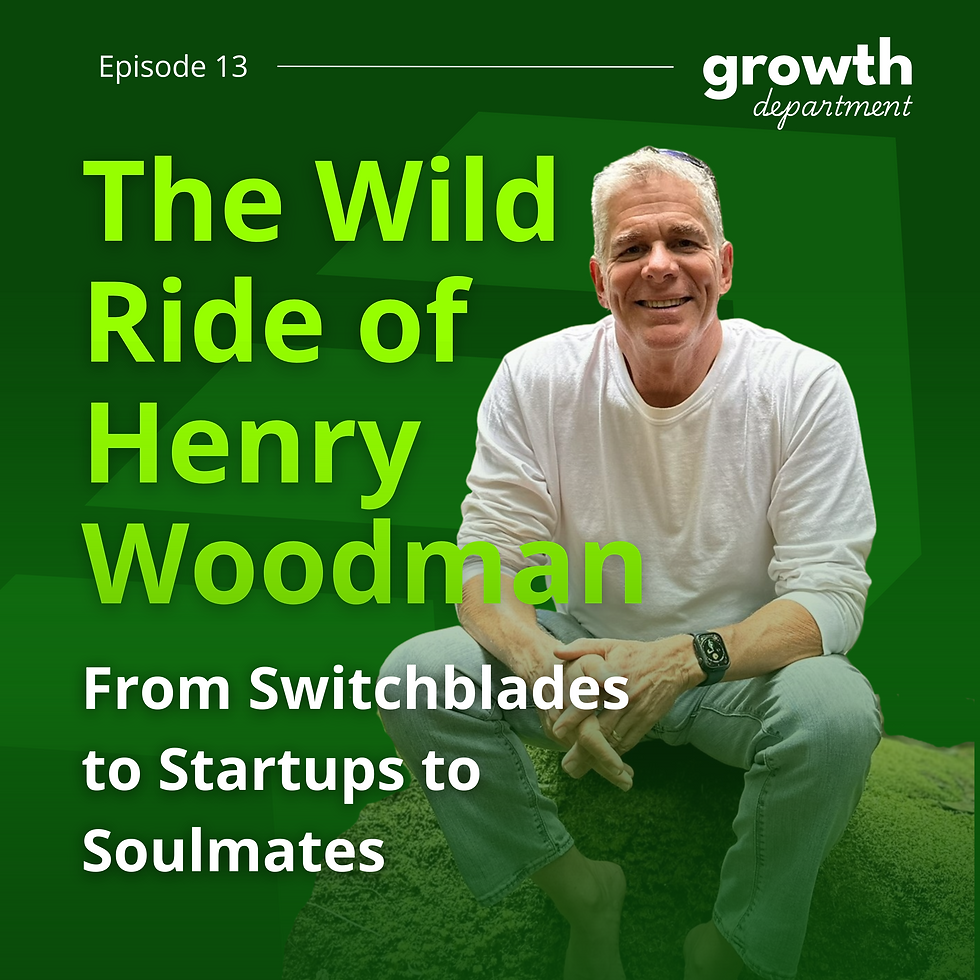Switchblades, Startups, and Soulmates: Henry Woodman’s Wild Ride Through Business and Beyond
- Chelsey Reynolds

- Aug 16, 2025
- 5 min read

If you think your career has zigged and zagged, wait until you meet Henry Woodman. He sold knives at 13, launched a television show in Chile, scaled and exited a global hotel tech platform, and now he’s producing a reincarnation-themed romance series written from a manuscript discovered in his dad’s garage.
Henry’s story is part startup rollercoaster, part creative redemption arc, and part “did that really happen?” In this episode of the Growth Department podcast, he sits down with host Chelsey Reynolds to talk discipline, deal-making, and the strange twists of entrepreneurship.
What unfolds is a masterclass in resilience and reinvention, told by a founder who never stopped chasing the next idea.
Knife Deals and Arcade Machines: The First Hustles
Long before Henry built a tech company, he was a swimmer with a side hustle in Mexico. At just 13, he stumbled into his first business deal when he brought a switchblade home from a swim meet in Mexico City. Friends wanted one too, so Henry went back and stocked up. He started flipping knives, turning a few dollars into profit margins that any hustler would envy.
That same curiosity and eye for opportunity followed him to college. At the University of Arizona, he was hooked on Pac-Man but annoyed his laundromat didn’t have a machine. Instead of just complaining, he called every laundromat in Tucson and asked if they had games. Most said no, but some said they’d love one.
So he used tuition money to buy an arcade machine at auction and struck a revenue-share deal with a local business. One machine turned into several, and soon Henry was running a profitable arcade business throughout Tucson.
“Opportunity presents itself,” Henry explained. “You just have to be looking for it.”
Travel Films and Knock-Off TV in Chile
Henry eventually sold his arcade machines and even won money on a game show, but like many ambitious twenty-somethings, he hit a creative slump. After burning out in Los Angeles, he joined a travel film crew and worked his way up from sound guy to assistant director to producer.
That gig brought him to Chile right as the country was opening to new media after decades of dictatorship. Networks were desperate for content, and Henry saw an opening.
“I pitched myself as an American producer, ripped off an American show, and a couple of months later we were on the air in Chile with a show called Machos,” he said.
What he called a knock-off looked more like pure founder energy in disguise. Rather than wait for permission or a perfect idea, he spotted an unmet demand, packaged something quickly, and delivered a quality product.
Accidentally Entering Tech
Henry’s path into tech wasn’t planned. While working in travel media, someone handed him a CD-ROM with a clunky 360-degree virtual tour. It was primitive by today’s standards, but to Henry it looked like the future.
“No film crew, no luggage, and you could look around a hotel room from your computer? I thought it was the future.”
That single CD sparked World Travel Vision, a company that produced and distributed virtual tours for hotels. But the real shift came when Henry realized the business wasn’t about making tours. It was about distributing them.
“What I realized is, the money wasn’t in the production. It was in the distribution.”
That shift gave birth to IcePortal, a media distribution platform that syndicated photos and videos for the world’s biggest hotel brands. If you’ve ever browsed images on a travel site, chances are you’ve seen Henry’s work without knowing it.
Growth Was a Grind, Not a Glamour Shot
The growth journey looked nothing like Silicon Valley fantasies. Henry admits he didn’t even know what terms like “KPI” or “culture” meant in the early days.
“I just didn’t want to fail. That was my whole vision.”
Instead of overnight success, IcePortal grew through grit. Cold calls, trade shows, bartered services, and relentless follow-up slowly built enough traction to win enterprise contracts. The company survived lawsuits, financial strain, and more than one near-bankruptcy.
The turning point came when Henry discovered Traction by Gino Wickman.
“It finally made things click—scorecards, vision, team structure. I bought it for everyone on the team. The backdoor password to our tech platform was literally ‘Gino Wickman.’ That’s how much it changed the game for us.”
Alongside the book, Henry joined Entrepreneurs’ Organization (EO) and leaned into building a team aligned around shared values. That structure gave IcePortal the foundation to keep moving forward, even when things looked bleak.
Still, Henry never had a safety net.
“If it didn’t work out, I was going to be asking if you wanted fries with that,” he joked.
The Exit—Right on Time
After years of slogging it out, the exit arrived. A global hospitality tech company came calling with acquisition interest. Henry wasn’t sure he was ready, but when they asked what number would make him sell, he gave them one. They didn’t blink.
“No banker. No drama. Sixty days later, the money was in the bank.”
The timing could not have been better. The deal closed just one year before COVID devastated the travel industry. For Henry, it was a once-in-a-lifetime moment of luck meeting preparation.
Many founders see an exit as the final chapter. For Henry, it was a chance to circle back to his creative roots. The story he wanted to tell had been sitting in his father’s garage for decades.
The Reincarnation of Marie
When Henry was 23, his sister discovered a manuscript their father had written. Unlike his usual nonfiction travel books, this one was a reincarnation romance. It was imaginative, heartfelt, and surprisingly good. Henry bought the rights and held onto them for 40 years.
Now, he’s adapted it into a series called Slippin’. Imagine The Time Traveler’s Wife blended with Everything Everywhere All At Once, layered with karma, soul contracts, and historical fiction.
The plot follows a man who finds the journal of a woman who died 70 years earlier and becomes convinced she was writing directly to him.
The manuscript has already picked up indie awards, and Henry is experimenting with AI tools to create teaser content for pitching it as a production.
“Studios might not want to spend $10 million and 18 months when AI can produce something 80% faster and cheaper. It’s coming. I don’t want to fight it. I want to use it.”
Lessons Founders Can Steal from Henry Woodman
Henry’s story is entertaining, but it also carries lessons for any founder building something from scratch. His path proves that growth doesn’t always follow a playbook. Sometimes it looks like knives, arcade machines, and lawsuits before it looks like an exit.
Here are a few takeaways worth keeping close:
Opportunity doesn’t knock—it whispers.Most great businesses start from noticing something obvious but overlooked. Henry spotted gaps in laundromats, Chilean television, and hotel distribution that others ignored.
Timing is luck, stamina is earned.His exit lined up perfectly with global events, but the decades of grinding growth were the real reason he made it.
Vision is learned, not inherited.Henry didn’t start with clarity. He learned strategy through books, mentors, and trial and error. Founders can grow vision over time.
Momentum comes from people.From EO peers to his own hires, Henry surrounded himself with people who brought energy, focus, and accountability. He says it best: “You’re the average of the five people you spend the most time with. So make them count.”
Creative detours fuel the long game.What looks like distraction in the moment may later become the foundation of your next chapter. Henry’s TV knock-off and his father’s manuscript became stepping stones for what he’s creating now.
Each of these lessons is a reminder that entrepreneurship is rarely linear. Progress looks like a messy patchwork until, eventually, it looks like a story worth telling.
Want More?
🎧 Listen to the full episode of the Growth Department podcast with Henry Woodman wherever you get your shows.
📚 Check out The Reincarnation of Marie in paperback or grab the audiobook, narrated by Henry himself. Follow Henry on LinkedIn or Instagram.




Comments